
Toona, commonly known as redcedar, toon or toona, tooni is a genus in the mahogany family, Meliaceae, native from Afghanistan south to India, and east to North Korea, Papua New Guinea and eastern Australia. In older texts, the genus was often incorporated within a wider circumscription of the related genus Cedrela, but that genus is now restricted to species from the Americas.

Festuca (fescue) is a genus of flowering plants belonging to the grass family Poaceae. They are evergreen or herbaceous perennial tufted grasses with a height range of 10–200 cm (4–79 in) and a cosmopolitan distribution, occurring on every continent except Antarctica. The genus is closely related to ryegrass (Lolium), and recent evidence from phylogenetic studies using DNA sequencing of plant mitochondrial DNA shows that the genus lacks monophyly. As a result, plant taxonomists have moved several species, including the forage grasses tall fescue and meadow fescue, from the genus Festuca into the genus Lolium, or alternatively into the segregate genus Schedonorus.

The common periwinkle or winkle is a species of small edible whelk or sea snail, a marine gastropod mollusc that has gills and an operculum, and is classified within the family Littorinidae, the periwinkles.

Toona ciliata is a forest tree in the mahogany family which grows throughout South Asia from Afghanistan to Papua New Guinea and Australia.

Elsholtzia ciliata, commonly known as Vietnamese balm, comb mint, xiang ru (香薷) or kinh giới in Vietnamese, is a flowering plant in the family Lamiaceae native to Asia. In the US, it is commonly known as Crested Late Summer Mint. In US Vietnamese grocery stores, it is called Kinh Gioi, Vietnamese Lemon Balm, or Vietnamese Lemon Mint.
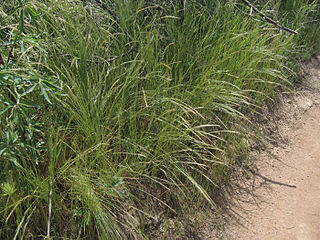
Vulpia myuros, the annual fescue, or rat's-tail fescue, is an annual flowering plant in grass family Poaceae. It was probably originally native to Eurasia, but it can now be found nearly worldwide as a naturalized species.
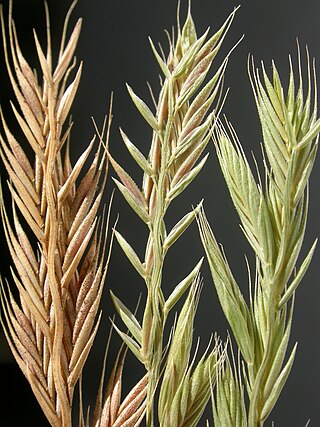
Vulpia is a widespread genus of plants in the grass family, native to many countries around the world and naturalized in many of the nations to which it is not native. It is most common in temperate regions.

Vulpia bromoides, squirreltail fescue, barren fescue or brome fescue, is a species of grass in the family Poaceae. It is a winter annual native to Europe, North Africa, and West Asia, but has been introduced to parts of the America, South Africa, Australia, New Zealand and isolated parts of East Asia.

Lysimachia ciliata, the fringed loosestrife, is a species of flowering plant in the family Primulaceae. It is an erect herbaceous perennial growing to 120 cm (47 in) tall and 60 cm (24 in) broad, with opposite, simple leaves, and smooth green stems. The star-shaped yellow flowers are borne in midsummer. It is native to North America, including most of southern Canada and most of the United States except for the southwest. This plant is notable in that it is one of the few species of Lysimachia to bear elaiophores, that is, to offer oil instead of nectar as a reward to pollinators. It is pollinated in the northern part of its range by the specialist oil bee Macropis nuda, a native bee species whose survival depends upon this host plant.

The Tingidae are a family of very small insects in the order Hemiptera that are commonly referred to as lace bugs. This group is distributed worldwide with about 2,000 described species.
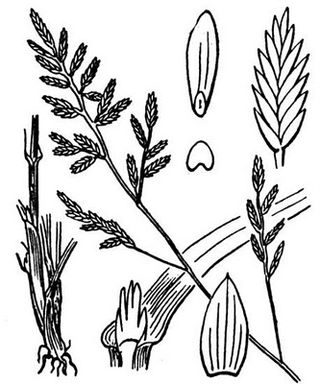
Catapodium is a genus of Eurasian and North African plants in the grass family.

Micropyrum is a genus of European and North African plants in the grass family.
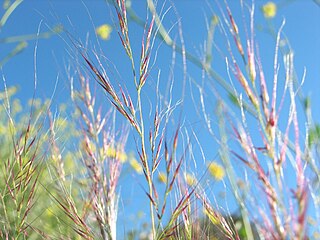
Vulpia microstachys is a species of grass known by the common names small fescue and small sixweeks grass. It is native to western North America from British Columbia to Colorado and New Mexico to Baja California, where it grows in many types of open habitat, including grasslands. It is dominant on some grasslands of California, and it was probably an abundant native grass before the habitat was altered by invasive non-native grasses. It occurs on serpentine soils with associates such as serpentine reedgrass. It is also known from parts of South America. It is an annual grass producing one stem or a clump of several stems growing up to 75 centimeters tall. The inflorescence has several open branches bearing clusters of purple-tinged spikelets. The spikelet has one to six flowers. The grass is usually cleistogamous, its flowers fertilizing themselves.

Blephilia ciliata is a species of herbaceous perennial plant in the Lamiaceae (mint) family native to central and eastern North America. It is commonly called downy wood mint. Other common names include downy pagoda-plant, sunny woodmint and Ohio horsemint.
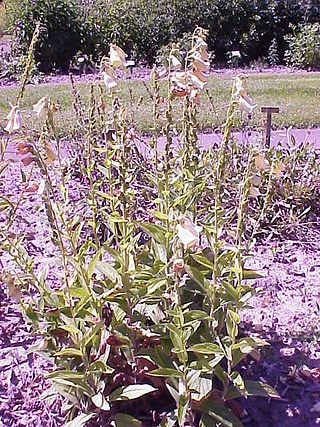
Digitalis ciliata, commonly called hairy foxglove is a member of the genus Digitalis. It has thimble-shaped, yellow to cream-colored flowers produced on perennial plants with evergreen foliage. It is native to the Caucasus and is grown as an ornamental plant in other parts of the world. The species name is derived from the fine hairs that cover the plant's stems and flowers.

Festuca octoflora, also known as Vulpia octoflora, is an annual plant in the grass family (Poaceae). The common name six-week fescue is because it supplies about 6 weeks of cattle forage after a rain. Other common names include sixweeks fescue, six-weeks fescue, pullout grass, eight-flower six-weeks grass, or eight-flowered fescue.
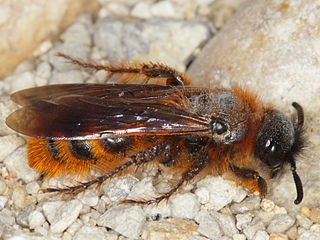
Dasyscolia ciliata is a species of scoliid wasp found throughout the Mediterranean. It is the only species in the genus Dasycolia. It is the only known pollinator of the European Ophrys speculum. The male wasp is tricked into pollinating the Ophrys orchid by mimicking the female wasp in appearance and scent.

Hippocrepis ciliata is a species of annual herb in the family Fabaceae. They have a self-supporting growth form and compound, broad leaves and dry fruit. Individuals can grow to 17 cm tall.

Vulpia fasciculata, the dune fescue, is a species of annual herb in the family Poaceae. They have a self-supporting growth form and simple, broad leaves. Individuals can grow to 0.24 m.


















